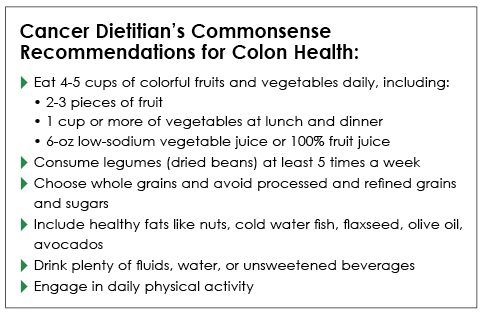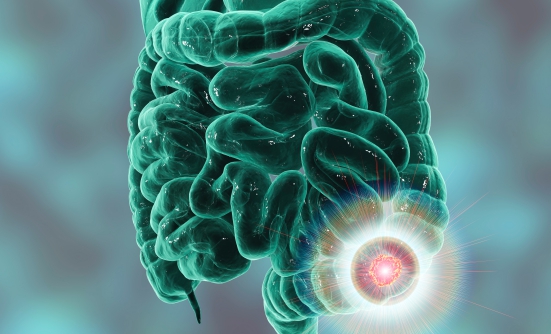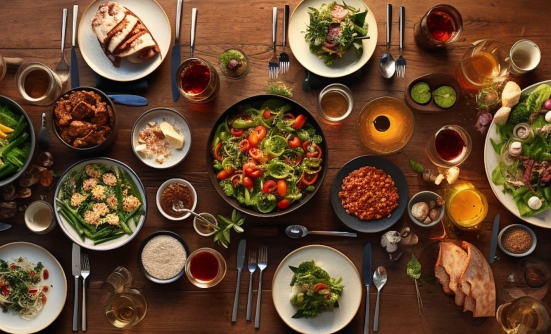Diet and nutrition are always hot topics when it comes to colon cancer. This is probably because the GI (gastrointestinal) tract is the organ responsible for digesting and absorbing nutrients from food, and the colon, of course, is part of the GI tract. It therefore makes sense that the foods you eat would influence the function of your colon during and after cancer treatment.
It’s sometimes amusing to consider what people believe contributes to a healthy colon. From enemas to special concoctions that you drink, many interesting ideas are circulating out there, but those are not based on any evidence. Still, many people believe in them.
However, when it comes to what people with colon cancer should eat, common sense wins.
Colon Cancer Risk
The American Institute for Cancer Research does a great job keeping up with all the studies on cancer, nutrition, and physical activity, and even ranks the evidence by the strength of the data. Their conclusions regarding colon cancer risk are that processed and red meat, as well as alcoholic drinks, increase the risk for colon cancer, whereas physical activity, whole grains, and foods containing dietary fiber decrease the risk. The American Institute for Cancer Research recommends that cancer survivors follow the same recommendations that we give the general public regarding cancer risk reduction.
When it comes to things that increase the risk for cancer, I think of it more as a risk management strategy rather than a risk avoidance strategy. The risks that we are exposed to are not guaranteed to cause cancer.
It’s the frequency and amount that we are exposed to that can contribute to a cancer growing. My patients sometimes come in very concerned about having to avoid some of their favorite foods, and I remind them that they can still enjoy their favorite foods, but in some cases, they may need to limit how often they enjoy those foods.
Processed & Red Meat: Where’s the Limit?
The current recommendation from the American Institute for Cancer Research is to avoid processed meats and limit the consumption of red meats.
Processed meat has been cured, salted, smoked, or otherwise preserved in some way. Included in this group are things like cold cut sandwich meats, bacon, sausages, hot dogs, ham, salami, and pepperoni. Note: mechanical processing like grinding or mincing doesn’t make it “processed meat.”
The recommendation to “avoid processed meats” is a tough one. Many people enjoy the flavor that bacon and other processed meats provide. In this case, finding a balance is key.
If you eat a small amount of processed meat a few times a month, it’s probably not a problem. However, if you have processed meat sandwiches every day (at work), you may want to consider an alternative protein source.
When it comes to red meat, the recommendation is to consume no more than 18 ounces a week, or just more than 1 pound of meat.
Alcoholic Drinks: Defining Moderation!
For cancer prevention, the American Institute for Cancer Research recommends not drinking alcohol at all. They also recommend that if it is consumed at all, to have no more than 2 drinks a day. By the way, those cannot be saved up for the weekend or an end-of-the-month binge!
When it comes to drinking alcohol, most people find a way to enjoy some, but not too much of it. One thing we know for sure, though, is: If you currently don’t drink alcoholic beverages, we recommend that you don’t start.
Keep Moving
More important than knowing what increases cancer risk is knowing what to do more of to keep your body as healthy as possible. When it comes to colon cancer risk and survivorship, the key is to be sure that you find ways to move your body that you find fun.
Physical activity is known to reduce the risk for cancer, and it should be enjoyable. It doesn’t have to be all at once; you can do your movement in 10-minute bouts throughout the day.
Plants
Another important thing to do is to make sure that you eat plenty of plants, including whole grains, beans, fruits, and vegetables. By having these foods regularly, you will get plenty of fiber, which is important for colon health.
Regretfully, most Americans get only half the intake of fiber that is recommended.
In general, it’s best to get your nutrients, including fiber, from food sources rather than from supplements, so here is my list of commonsense recommendations for colon health. You will get plenty of fiber if you follow these recommendations most of the time.
Important Exceptions
It’s important that I recognize that not all colon cancer survivors can tolerate this type of diet. For many survivors who have had radiation, chemotherapy, or surgery to remove parts of their colon, it’s essential that they follow a low-fiber diet. If you are in this situation, do not despair.
For people interested in having fresh fruits and vegetables without the fiber, juicing can be a good option. Some patients I have worked with don’t tolerate raw fruits and vegetables, but they can tolerate cooked fruits and vegetables, or fruits and vegetables that have been blended into soups and smoothies.
Be sure to talk with your cancer center dietitian, nurse, or doctor to brainstorm options for optimal nutrition intake despite the challenges you are facing. Also remember that nutrition is only one aspect of your overall health and wellness plan.
You can consume a low-fiber diet and still be sure to care for your body by being physically active, avoiding tobacco, managing alcohol intake, and doing activities that bring you joy and relaxation.
For more tips on nutrition during and after cancer treatment, visit www.cancerdietitian.com/tips.
Key Points
- Processed and red meat, and alcoholic drinks increase the risk for colon cancer
- Physical activity, whole grains, and foods containing dietary fiber decrease the risk
- Processed meat includes cold cut sandwich meats, bacon, sausages, hot dogs, ham, salami, and pepperoni
- When it comes to red meat, the recommendation is to consume no more than 18 oz a week
- Eating fiber-rich foods is important for colon health
- Juicing is a good option for people interested in having fruits and vegetables without the fiber
Patient Resources
American Institute for Cancer Research
https://www.aicr.org/reduce-your-cancer-risk/diet/red-and-processed-meat.html
Centers for Disease Control and Prevention
https://www.cdc.gov/cancer/colorectal/basic_info/prevention.htm
National Cancer Institute
https://www.cancer.gov/types/colorectal/patient/colorectal-prevention-pdq












